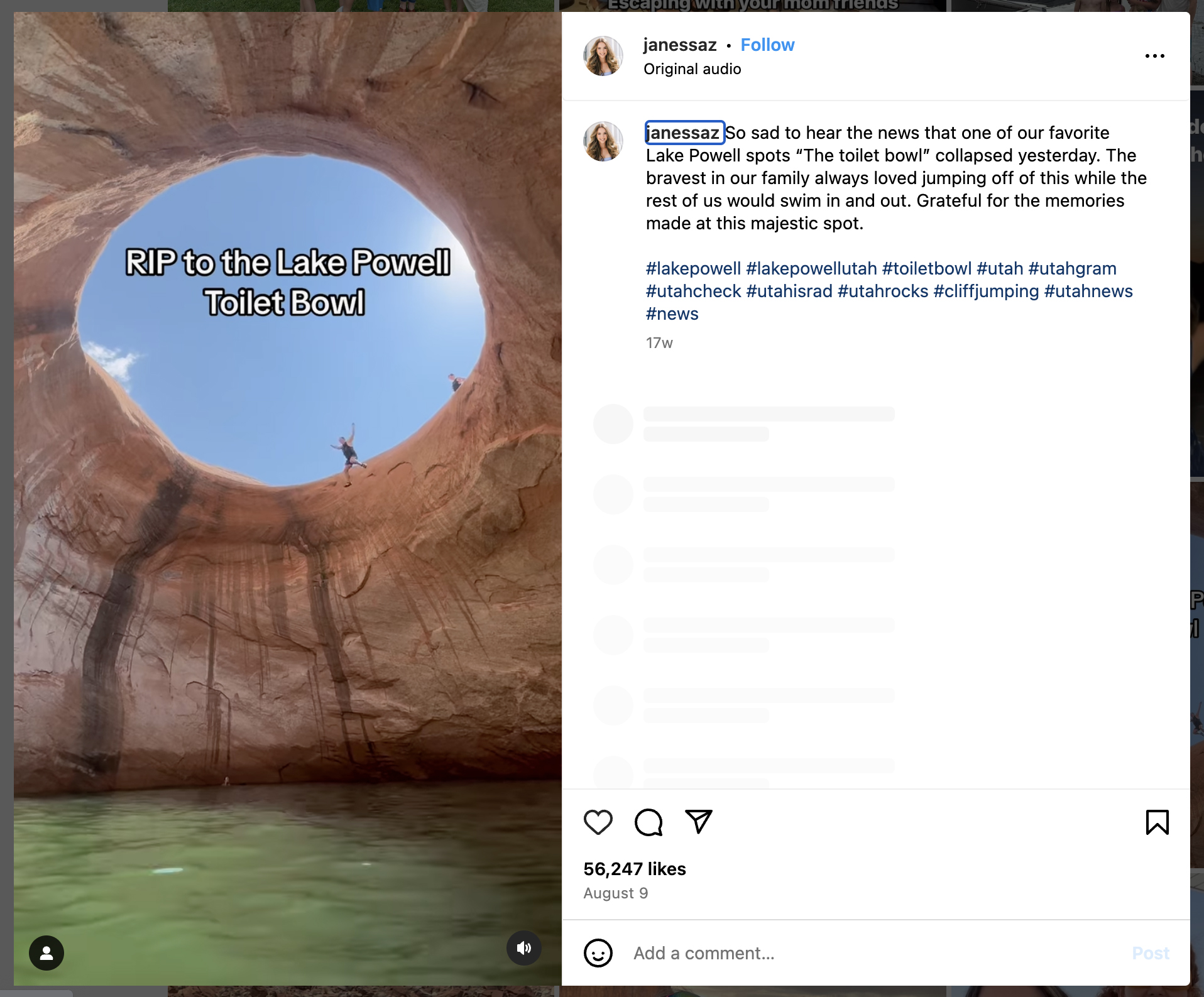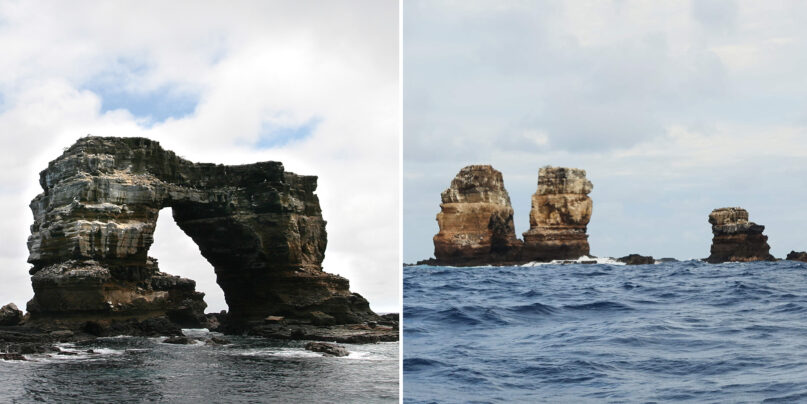(RNS) — What’s the most significant event to happen to our planet in 2024? It might be the sudden collapse last August of Utah’s ancient and spectacular Double Arch, a circular stone formation on Lake Powell known familiarly as “Nature’s Toilet Bowl.”
Big deal?
Not so, said Jeff Moore, a professor of geology at the University of Utah, who called it “just a natural process in the life span of an arch.” A National Park Service statement reassured us that the sandy formation had already been broken and eroded by weather, wind and rain over the course of many years.
So, in other words, it had nothing to do with human-driven climate change.
Nothing to see here. Keep the line moving.
I have my doubts. Double Arch was formed from Navajo sandstone dating to 190 million years ago, during the late Triassic to early Jurassic periods. Shouldn’t we be concerned that a natural structure that has been in existence for 190 million years spit the bit and had its number called now? This year?
When it seems like the whole world is metaphorically crashing down around us, it’s rather disconcerting to have 190-million-year-old rock formations literally crashing down around us!
As with any sudden disappearance of something that’s been a constant in our lives — and for about 185 million years before there was human life — some people waxed sentimental about the loss. One person wrote on Instagram of this “majestic spot,” reminiscing how intrepid family members would jump from the rim into the water far below.

Instagram post by Janessa Zech about the Lake Powell Toilet Bowl. (Screen grab)
OK, so the rational side of me understands that natural structures have a life cycle, like trees and people, and there’s something comforting about that. Rock formations, like stars, “die” too, only a whole lot more slowly than us.
A National Parks spokesperson, Michelle Kerns, did not rule out the human factor, saying: “This event serves as a reminder of our responsibility and need to protect the mineral resources surrounding Lake Powell. These features have a life span that can be influenced or damaged by manmade interventions.”
But we must also consider that this is just the way of all rock. Quoted in an AP story, Karen Garthwait, spokesperson for Arches and Canyonlands national parks, said, “Our mission is not to freeze time and preserve these structures exactly as they are. Our mission is to preserve the natural processes that create these structures, which of course, is the same process that will eventually undo them as well.”
Our mission as believers in the Creator is to treasure these magnificent structures for the priceless wonders that they are, and to treat all of God’s works with respect and the utmost care.
The Double Arch is not the only natural structure to meet its maker in recent years. In May 2003, a profile in granite called the “Old Man of the Mountain,” the stately symbol of the Granite State of New Hampshire, instantaneously became the “Dearly Departed and Defaced Old Man of the Mountain.”
In 2021, another iconic rock formation, Darwin’s Arch, off the coast of the Galápagos Islands, suddenly tumbled to the sea. So much for the survival of the fittest.

Darwin’s Arch in 2003, left, and the collapsed remnants in 2024. (Photos courtesy of Wikimedia/Creative Commons)
Manmade structures are hardly immune. In 2018 a 220-pound stone suddenly fell from the upper reaches of the Western Wall in Jerusalem. Recently, homes in Nantucket and on the coast of California have tumbled into the sea.
There is a message here we need to understand. Nothing lasts forever. The only thing that is permanent is change itself.
Oh, and one other thing: love.
Isaiah, the biblical prophet of the 600s B.C.E., understood that, writing:
For the mountains may move
And the hills be shaken,
But my loyalty shall never move from you,
Nor My covenant of friendship be shaken
—said GOD, who takes you back in love.
Isaiah was speaking from the depths of the Israelites’ exile in Babylon, envisioning the ruins of the Temple back in Jerusalem, but he could just as well have been in Utah, staring at the ruins of Double Arch. Yet he saw natural and man-made calamities not as signs of an existential unraveling, but as something more hopeful.
It’s not the unshakability of an eons-old arch that galvanizes our faith, Isaiah said, for we know that the rock’s stability is illusory. In fact, it is the structure’s very fragility that awes us, as it defies the laws of gravity, like the Earth itself. It is suspended in space seemingly effortlessly, but all along it is fighting, straining, pushing heroically against gravitational and erosive forces so great and so invisible that only it perceives the Sisyphean nature of its task.
Eventually, like a patient breathing its last, the arch just has to give way to the inevitable.
What is true for the arch is true for the planet, and true for you and for me. As we age, our arches begin to fall too, our balance wavers in the wind. But love propels us to stand upright and trudge forward, leaning into the gale.
Faith has less to do with the permanence of those structures than with the love that helps us to pick up the pieces when they inevitably fall.
The Gershwin brothers turned Isaiah’s prophetic words into a love song so immortal that it might outlast every arch in Utah, covered for generations by great musicians, as it has thus far, from Frank Sinatra and Ella Fitzgerald to Natalie Cole and Tony Bennett. The love reflected in this gift from Ira and George will remain steadfast forever.
In time the Rockies may crumble
Gibraltar may tumble
They’re only made of clay
But our love is here to stay.
Everything changes, and as we rush headlong to a new year, so much seems to be crumbling around us. But love and faith will see us through.
(Rabbi Joshua Hammerman is the author of “Mensch-Marks: Life Lessons of a Human Rabbi” and “Embracing Auschwitz: Forging a Vibrant, Life-Affirming Judaism That Takes the Holocaust Seriously.” See more of his writing at his Substack page, “In This Moment.” The views expressed in this commentary do not necessarily reflect those of Religion News Service.)